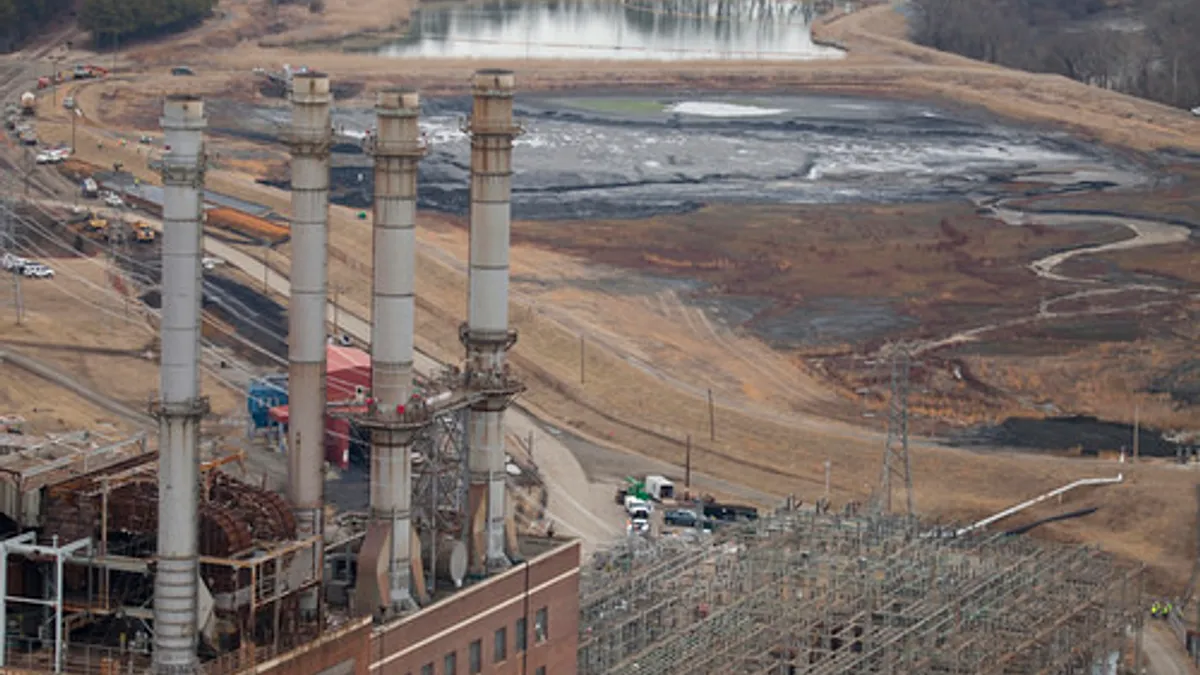Dive Brief:
- Advocates praised a South Carolina Supreme Court ruling upholding a state order denying Duke Energy's proposed rate increase for South Carolina customers to cover environmental cleanup costs in North Carolina.
- Duke Energy Progress and Duke Energy Carolinas initially proposed a rate increase in 2018 in response to a North Carolina law that set strict standards on the handling and disposal of coal ash, a byproduct of coal-fired power generation. The proposal would have levied a 2.5% increase on its monthly variable rate for residential customers in South Carolina, saying residents should share the increased cost of power generation they benefit from.
- The state Supreme Court ruling, issued last week, affirmed a decision by the South Carolina Public Service Commission (PSC) rejecting the rate increase. The additional costs, the court found, "neither directly benefited Duke's South Carolina customers, nor were they intended to do so."
Dive Insight:
North Carolina in 2014 passed the nation's first coal ash management law, requiring that all coal ash ponds be closed by 2029 and imposing new permitting and design requirements on the use of ash. The law was in part inspired by a 2014 accident where two failed pipes at a Duke dump site broke, releasing toxic sludge over 70 miles of the Dan River. Duke, which operates more than 30 coal ash ponds and several coal-fired power plants in the state through its subsidiaries, said at the time that it could cost $7-10 billion to comply with the law and has worked for years to develop a payment plan. In January, the utility reached a settlement with state regulators to write off some $1.1 billion in coal ash costs for its North Carolina customers, while also reducing its return on equity for those costs.
The company had also proposed raising rates for South Carolina, citing coal ash cleanup costs in both states and litigation expenses from coal ash lawsuits. The South Carolina PSC eventually granted Duke less than 50% of the remediation costs requested by the utility, removing any costs corresponding to the North Carolina law, and denied all coverage of litigation expenses. Duke rejected the agreement, leading to the lawsuit.
Wallace Lightsey, an attorney with the Wyche Law Firm who represented the state and ratepayers in the suit, said Duke's proposal "would have had a significant impact on ratepayers' monthly bills," despite South Carolinians having no role in the coal ash cleanup requirements.
"Sometimes costs that are reasonably incurred are rightly allocated to a specific class of people or a specific jurisdiction," Lightsey said. The case, he said, was a strong rebuke to Duke's attempts to spread its own costs more broadly, calling it "a big win for consumers."
Nanette Edwards, director of the state's Office of Regulatory Staff, applauded the ruling as "a victory for Duke Energy's South Carolina customers."
"We argued that Duke Energy's South Carolina ratepayers should not pay for hundreds of millions of dollars in increased environmental clean-up costs attributed to legislation from another state," Edwards said.
In a statement, Duke Energy spokesman Ryan Mosier said the company is still evaluating the order, but is "certainly disappointed" in the ruling.
"We disagreed with the Public Service Commission of South Carolina in these rate cases because we believe the costs in question were appropriate expenses incurred related to the generation of electricity which has served South Carolina customers for decades. Our argument before the court and the evidence in the case made that clear," Mosier said.
The company did not detail any plans for how it would pay for the coal ash remediation.
Lightsey said the ruling should set an example for utilities operating across state lines, especially as more local and state governments enact distinct environmental and clean energy laws that could raise costs.
"As more utilities operate across state lines, this is a reminder that political representation matters," Lightsey said. "If South Carolina customers think the [North Carolina] legislation isn't a good law or that the cost is not worth it, they can't do anything to change it. It's entirely appropriate that the customers who are represented by the politicians who enacted the legislation should take it on."














